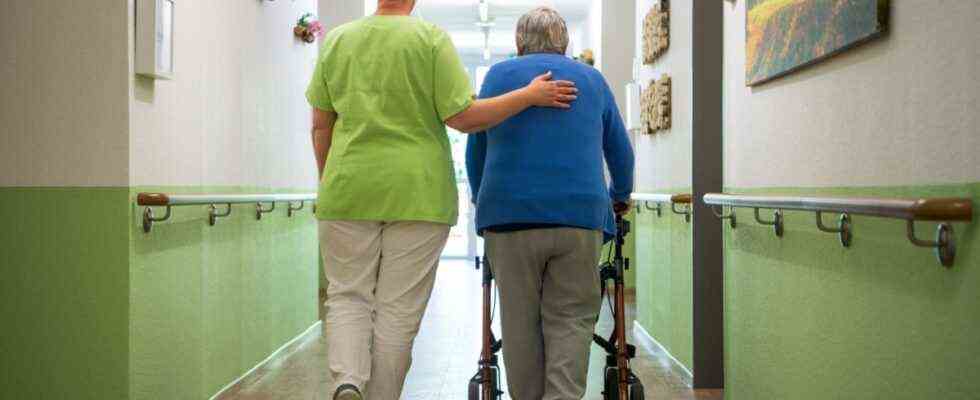It is well known that there is a shortage of nursing staff in Bavaria and elsewhere in Germany. The Diakonisches Werk Bayern of the Evangelical Church plays a key role in the care of the elderly. As the second largest welfare association in Bavaria, it provides 202 fully inpatient care facilities with 16,206 places. There are also 57 day care facilities and 79 assisted living facilities. Diakonie is also a “big player” in the increasingly important field of outpatient care. Significantly more than 200 social stations are distributed across the entire Free State. Accordingly, the Diakonie occupies a prominent position within Bavarian care for the elderly.
Nevertheless, stricter requirements apply to carers in a social welfare institution than elsewhere. The so-called ACK clause states that employees should generally belong to a church – preferably the Protestant one. The Basic Law allows the churches and consequently the diakonia to regulate certain questions independently. This also includes the selection of “suitable” employees. In the words of the Diakonie it sounds like this: “We need employees who know the basic Christian principles and who also stand by them.”
According to Diakonie, the ACK clause no longer has the same status as it used to
Even leaving the church during the period of employment can lead to the termination of the employment relationship, since it is seen as an “active and conscious distancing from the basics of diakonia”. Dirk Spohd says that he is not aware of any such dismissal cases. The managing director of “Hilfe im Alter”, a subsidiary of Diakonie München und Oberbayern, adds that in this situation the first thing to do is to seek a conversation. “But if someone rejects the Protestant Church and questions the attitude of charity, mercy and advocacy for social justice, we have to act,” says Spohd.
The Association of German Aid for the Elderly and the Disabled (VDAB) does not want to evaluate the Diakonie’s approach. The deputy federal manager Anna Klein announced, however, that it was playing into the hands of private companies in the tense competition for nursing staff, “since the diakonia with the restriction also excludes part of the labor market for itself”.
A report commissioned by the Bavarian State Ministry for Health and Care shows that the future development of care workers in Bavaria looks anything but rosy. The long-term care demand forecast up to 2050, compiled by the WifOR Institute, is not necessarily optimistic. According to this, the population in Bavaria will grow by 484,000 people in the next 20 years – that is more than in most other federal states. This also increases the number of people in need of care. According to WifOR calculations, the proportion of people over 80 in the total population is set to climb from the current four percent to around twelve percent in 2050.
Even now, however, the range of outpatient care services is viewed as “insufficient” in 60 percent of the Bavarian districts. In a summary of the report, the Ministry of Health writes that “due to the declining potential of the labor force, a considerable shortage of skilled workers in nursing can be expected in the next five years”. This can also be seen in the facilities of the Bavarian Diakonie. “In the case of new advertisements, a position is vacant for an average of 120 days,” says a spokesman for the Bavarian Diakonie. There are big problems filling the positions.
Probably because of these circumstances, the ACK clause has been interpreted much more loosely since 2017. Since then, the church institutions have been allowed to employ professionals who do not belong to any Christian denomination.
In the case of nurses and geriatric nurses, for example, exceptions can be made if a shortage of skilled workers makes this necessary. According to the Bavarian Diakonie, the ACK clause no longer has the same status as it used to. This is also related to the judgments of the labor courts, which judge a strict interpretation of the clause to be inadmissible. Nevertheless, employees are expected to “represent the goals and values of church and diakonia,” the spokesman said. Dirk Spohd from the Upper Bavarian Diakonie says that membership of a church is welcomed, but the diakonia moves with the times and therefore “diversity is also seen as an enrichment for our company”.
The Association of Nursing in Bavaria (VdPB) sees the opening of the ACK clause “in principle, sufficient leeway for institutions to meet the shortage of staff in the nursing sector by hiring specialists without religious affiliation”.
Nevertheless, some Diakonie institutions actually want Christian carers – if it weren’t for the nursing emergency. It is the same with Anke Möglinger, director of the Protestant care center in Ebersberg. “It is desirable that applicants have a Christian denomination, but due to the shortage of staff we cannot choose freely – if I had the choice, I would probably do it that way,” she says.

